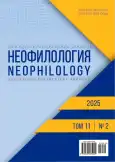Comparative analysis of memorial oeconyms and urbanonyms of the Kaliningrad region in historical and linguistic context
- Authors: Peteshova O.V.1
-
Affiliations:
- Immanuel Kant Baltic Federal University
- Issue: Vol 11, No 2 (2025)
- Pages: 249-258
- Section: PARADIGMS OF LANGUAGES AND MODERN LINGUISTICS
- URL: https://journal-vniispk.ru/2587-6953/article/view/297430
- DOI: https://doi.org/10.20310/2587-6953-2025-11-2-249-258
- ID: 297430
Cite item
Full Text
Abstract
INTRODUCTION. The purpose of the research is to compare renaming campaigns of the settlements and streets in the former northern part of East Prussia that formed the Kaliningrad region The focus is on those that either on the original German maps or on the new Soviet maps carry the names of prominent figures from the two respective cultures under consideration.
MATERIALS AND METHODS. While examining 2497 decrees on renaming settlements and 1000 decrees on renaming streets in these settlements, 642 memorial oeconyms and 674 memorial urbanonyms have been identified and consequently subjected to a comparative semantic analysis.
RESULTS AND DISCUSSION. It is presented that after the renaming the number of memorial oeconym has significantly increased, while the number of memorial urbanonyms remained essentially unchanged. As a result of the renaming dedications to entrepreneurs disappear from the maps, while the number of toponyms derived from the names of military personnel increases. Both spheres compared are characterized by the tendency to immortalize Soviet people on the background of a certain part of nominations formed from surnames of Russian and even Foreign cultural figures. While the original toponymic material is dominated by urbanonyms in honor of local celebrities, the new one, on the contrary, more often associates oikonyms with the culture of the region. The repetition of surnames in the base of onyms is peculiar to both studied time periods and both classes of toponyms.
CONCLUSION. It is concluded that similarities prevail over differences in all points of comparison.
Keywords
About the authors
O. V. Peteshova
Immanuel Kant Baltic Federal University
Author for correspondence.
Email: opeteshova@kantiana.ru
ORCID iD: 0000-0002-2902-5135
Cand. Sci. (Philology), Associate Professor, Associate Professor at the Institute of Education and Humanities
Russian Federation, 14 Aleksandra Nevskogo St., Kaliningrad, 236041, Russian FederationReferences
- Razumov R.V. Dedications to political figures in the urbanonymy of the Russian Federation. Materialy XXI Mezhdunarodnoi nauchnoi konferentsii «Onomastika Povolzh’ya» = Proceedings of the 21st International Scientific Conference “Volga Region Onomastics”. Ryazan, RSU named for S. Yesenin Publ., 2023, pp. 212-216. (In Russ.) https://elibrary.ru/gepomt
- Kotelnikova K.V. The influence of social factors on the evolvement of toponyms in German. Vestnik Bashkir-skogo Universiteta, 2014, vol. 19, no. 2, pp. 582-586. (In Russ.) https://elibrary.ru/smtexd
- Rusiya T.N. Personalist images in identity politics at the local level. Yuzhno-rossiiskii zhurnal sotsial’nykh nauk = South Russian Journal of Social Sciences, 2022, vol. 23, no. 1, pp. 81-95. (In Russ.) https://doi.org/10.31429/26190567-23-1-81-95, https://elibrary.ru/gqykzd
- Voroshilin S.I. Toponymic wars – violent change of toponyms owing to wars and revolutions (Part 2). Voprosy Vseobshchei Istorii, 2012, no. 14, pp. 145-164. (In Russ.) https://elibrary.ru/tqkvmv
- Demyanov K.V. The process of renaming of cities and streets in the soviet union: the question of periodization and the local specific. Youth of the Third Millennium. Omsk, Omsk F. M. Dostoevsky State University Publ., 2019, pp. 219-223. (In Russ.) https://elibrary.ru/bicilt
- Shulgina O.V. Historical and geographical approach in study of place names in Russian regions. Vestnik MGPU. Seriya «Estestvennye nauki» = MCU Journal of Natural Sciences, 2016, no. 2 (22), pp. 84-93. (In Russ.) https://elibrary.ru/vzsfel
- Terentev E.A. Place-(re)naming practices as an object of sociological study: an analytical overview. Vestnik Rossiiskogo universiteta druzhby narodov. Seriya: Sotsiologiya = RUDN Journal of Sociology, 2014, no. 3, pp. 73-86. (In Russ.) https://elibrary.ru/skhfaj
- Tkhakakhov V.Kh. Map of the city: the symbolic transformation in the north Caucasian space. Sotsi-ologicheskie issledovaniya = Sociological Studies, 2017, no. 5 (397), pp. 17-25. (In Russ.) https://elibrary.ru/yqrhcn
- Ryzhkov A.B. The sacralization of memorial place-names in social consciousness. Voprosy geografii = Prob-lems of Geography, 2018, no. 146, pp. 200-208. (In Russ.) https://elibrary.ru/xtlfzj
- Popov S.A. Extra-linguistic influence on toponymic nomination processes. Materialy XIX Mezhdunarodnoi nauchnoi konferentsii «Onomastika Povolzh’ya» = Proceedings of the 19th International Scientific Confer-ence “Volga Region Onomastics”. Orenburg, Orenburg Book Publishing House, 2021, pp. 57-63. (In Russ.) https://elibrary.ru/zltool
- Ivanova I.G., Zagainova E.I. National and cultural features of commemorative toponymic names in French and Russian. Aktual’nye Problemy Romano-Germanskoi Filologii i Prepodavaniya Evropeiskikh Yazykov v Shkole i Vuze, 2015, no. 2, pp. 18-28. (In Russ.) https://elibrary.ru/uosmrd
- Belyaeva I.V., Kulumbegova L.V. Onyms as markers of value conflicts. Vestnik Nizhegorodskogo gosu-darstvennogo lingvisticheskogo universiteta im. N.A. Dobrolyubova = Nizhny Novgorod Linguistics University Bulletin, 2023, no. 63, pp. 24-36. (In Russ.) https://doi.org/10.47388/2072-3490/lunn2023-63-3-24-36, https://elibrary.ru/lbjxyi
- Sudar A.M. Sociocultural aspect of the study of memorial toponyms in Argentina. Voprosy Ibero-Romanistiki, 2013, no. 13, pp. 94-103. (In Russ.) https://elibrary.ru/vjuxsd
- Demyanov K.V., Ryzhenko V.G. Ideology, toponymy, policy of memory: about city’s renaming in the USSR. Vestnik Omskogo universiteta. Seriya «Istoricheskie nauki» = Herald of Omsk University. Series Historical Studies, 2017, no. 4 (16), pp. 153-160. (In Russ.) https://doi.org/10.25513/2312-1300.2017.4.153-160, https://elibrary.ru/urjiti
Supplementary files









